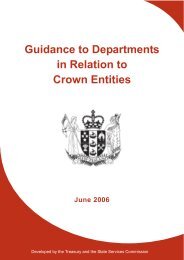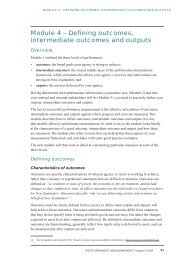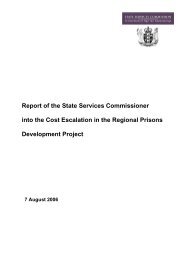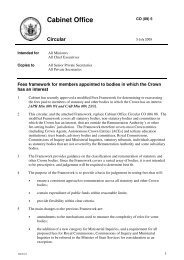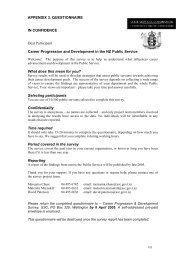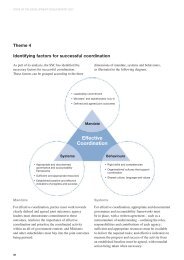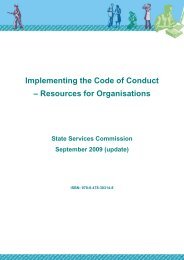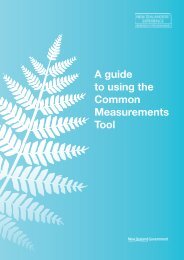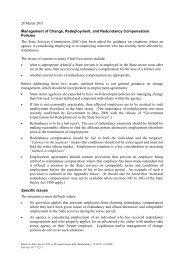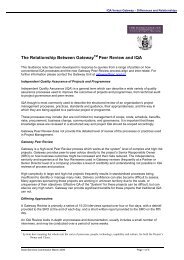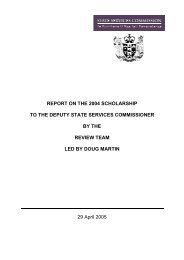Better Public Services Advisory Group Report - November 2011
Better Public Services Advisory Group Report - November 2011
Better Public Services Advisory Group Report - November 2011
You also want an ePaper? Increase the reach of your titles
YUMPU automatically turns print PDFs into web optimized ePapers that Google loves.
<strong>Better</strong> services and value-for-money<br />
Getting better outcomes for New Zealanders – within appropriate legal and constitutional<br />
settings - is the highest calling for government and the state services. Improving the quality,<br />
responsiveness and value-for-money of state services comes not far behind.<br />
One powerful driver to improve quality and cost is to make more information available to<br />
citizens. Citizens and businesses expect to have a say on state services: on what they need,<br />
how they want it and who they get it from. This needs to be a routine expectation of both<br />
agencies and third-parties that provide services. It means listening to – and being held to<br />
account for acting on – this feedback, probably using the internet as a principal channel of<br />
interaction. Amplifying the direct influence of citizens and businesses on service delivery is at<br />
the heart of state sector reform in the United Kingdom and in Australia.<br />
Harnessing the power of choice is also a feature of the discussion of best-sourcing in this<br />
report. There are already good examples of gains in quality and price being captured through<br />
the outsourcing of service delivery (eg, in the Accident Compensation Corporation [ACC]). The<br />
<strong>Advisory</strong> <strong>Group</strong> considers that there is room to go further, in part by the state agencies<br />
responsible for funding services getting much better at contracting in innovative ways. There is<br />
currently a capability gap in contracting skills that needs to be addressed, alongside a clear<br />
requirement for government agencies to consistently demonstrate that they have tested their<br />
service offering against alternative forms of provision.<br />
Much has been made of the proliferation of government agencies in New Zealand, with its<br />
consequences for diseconomies of scale, higher overhead and transaction costs, and protracted<br />
decision-making 2 . The <strong>Group</strong> supports this assessment. Some consolidation of agencies is<br />
desirable, particularly where current arrangements make it harder to gain traction on results.<br />
Disestablishing some functions is also worth exploring. The <strong>Advisory</strong> <strong>Group</strong> do not, however,<br />
consider that a sharp reduction of agencies across the board would necessarily deliver better<br />
performance. Restructuring is expensive and disruptive and can be counter-productive, at least in<br />
the short term.<br />
But there are multiple opportunities to rationalise accommodation or to consolidate functions<br />
(such as corporate services or policy advice) across agencies which do not involve either the<br />
disestablishment of existing entities or wholesale restructuring.<br />
State services need to be built on a culture where these sorts of opportunities are consistently<br />
sought out. Finding better ways to deliver value and better quality services needs to be front<br />
and centre for all state employees – leaders, managers and staff. The <strong>Advisory</strong> <strong>Group</strong> has<br />
seen sufficient examples of continuous improvement (eg, “lean” programmes at the Ministry for<br />
Social Development, the Inland Revenue Department and at district health boards) or channel<br />
consolidation (eg, at Land Information New Zealand) to be confident that further gains are<br />
available.<br />
2<br />
See, for instance, the <strong>Report</strong> of the <strong>Advisory</strong> <strong>Group</strong> of the Review of the Centre, <strong>November</strong> 2001.<br />
7



